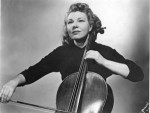Column Name
Title
Cellist Ardyth Alton, a member of the Pre-College faculty since 1968 and a College Division faculty member since 1985, died on December 27, 2007. Her daughter Ann, who has been on the Pre-College faculty since 1994, reflects on the legacy of a mother who was also a mentor—to her, and to generations of young musicians.
Body
As a teacher, what I learned most from my mother was her respect and love of the individual student. Even if someone wasn’t especially talented, she would try to find something special about them to build on. One of my colleagues once referred to her as “the great encourager.” I can remember her worrying about different students’ problems. My father used to complain that she was continually on the phone with students. Later, he began to enjoy being part of an extended family of many students who loved him, too. (She married my father, Thad Alton, while studying at Juilliard, after bringing him to meet her cello teacher, Felix Salmond, for his approval. They were married for about sixty years.)
As a performer, she believed you had to be bigger than yourself. You had to communicate all the emotions and excitement you felt to the audience, because they came to hear you play.
Her career took off when she won a competition for management with the National Music League. She had several trios under Columbia Artists Management, including the American Concert Trio and the New York Concert Trio. She gave more than 2,000 solo and trio concerts with Columbia Artists. In addition to Juilliard, she taught at the Manhattan School of Music, New York University, and SUNY at Purchase.
A few years ago—when, as usual, she was worrying about the ability of one of her students to afford continued study at Juilliard—my mother wrote a letter to a Juilliard administrator about how lucky she had been during her own experience as a graduate student. (She later helped fund this student’s tuition.) This letter, written in 2003, to a Juilliard administrator, turned into an extended reminiscence about why she considered herself to be so lucky. I hope you enjoy her recollections, which follow.
In Her Own Words
I am one of the luckiest people in the world. And one of the best things that ever happened in my life was my association with Juilliard. I am very, very grateful to Juilliard and I have always felt that I could never do enough to repay what has been done for me.
I was born [on October 3, 1916] and grew up in a small town, Cherokee, Iowa. My father was an engineer on the Illinois Central Railroad. My mother, grandmother, brother, and three sisters all played and sang music. Music was a major part of our lives. My father died when I was 15, and my mother gave piano lessons to help pay the bills. I finished high school, and went on to the Oberlin Conservatory. At Oberlin I received a complete scholarship, with board and room. In addition, I worked in the kitchen, made salads, and said the prayers at meals in the dining hall.
I went to Chautauqua in the summer, where I received lessons and played, and also received a scholarship in a competition. There was a fine orchestra there, conducted by Albert Stoessel, and there were many Juilliard faculty and students. Mrs. Thomas Edison was a leading figure there. Every Wednesday, she hosted a meeting of “The Bird and Tree Club” at her home. Each week she asked me to play the cello for the ladies who attended. During that summer, Albert Stoessel suggested that I apply to Juilliard in their professional or post-graduate program. He made the arrangements for a special audition in late August, and I went to New York on the overnight train. The next day I auditioned at Juilliard. I had no money—less than $10—so I stayed with a friend the first night. The next day I called the school to see if I had been accepted. I knew I couldn’t stay in New York very long with no money! They said they couldn’t tell me yet. I explained my situation, so they said, “We think you should make preparations to stay in New York.” Of course, I still had no money, so I went out and pawned my watch on Madison Avenue for $10!
I received a complete graduate fellowship. In addition, I received meal tickets so I could eat lunch at the school. I then found a place to live, through a friend, Eugenie Dengel, angel that she is, and she also got me a job in her trio at the hotel where we lived in New York. At that time, in the graduate school, people often stayed three years, but you could stay four or even five, if you were making good progress. I hadn’t started cello until I was older than some people, so I was happy to have five years of post-graduate study at Juilliard. I received so much in all those years at Juilliard in such a generous, beautiful, way. If we needed something there was no problem. And for two years every month I got a check from Mrs. Thomas Edison. She suggested I use the money to buy a cello, which I did—a nice French cello.
At the end of those years I graduated with a special award. It was called “On Advice,” and that meant that you could come back to school for lessons (“advice”) because you deserved continued support, especially if you had concerts. That’s what happened. I had a manager and some concerts, so I went back to Felix Salmond and Leonard Rose for cello lessons before these concerts. I was the luckiest person in the world, and I have continued to be lucky.
— Ann Alton





